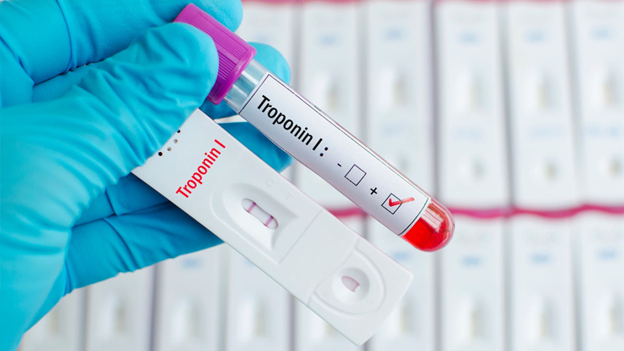Keeping our hearts in top shape is key to a long life. Today’s lifestyle risks can harm heart health, so early diagnosis matters. With regular checkups, heart disease risks drop sharply. Among various diagnostic options, the troponin test is crucial. It serves as an early warning tool and allows timely medical care. Recognizing its importance helps ensure our hearts stay healthy.
Heart diagnostic methods are evolving with many tools assessing heart function nowadays. From echocardiograms to stress tests, each has its purpose. A major one is the troponin blood test. It detects proteins called troponins when heart muscle is damaged. These tests crucially spot heart issues early on. Whether symptoms persist or you have pre-existing conditions, troponin testing gives detailed insights into your heart’s status. Its role in heart examinations is truly significant.
Understanding Troponin Tests: A Clear Look into the Heart’s Needs
Troponin is a vital part of heart muscle cells. It works to keep everything running smoothly within the heart itself. Its primary job is to help muscles contract, ensuring each heartbeat is effective. A troponin test measures these protein levels, playing a crucial role in diagnosing if your heart is doing okay.
Troponin tests are grouped into two categories: Troponin T and Troponin I. While both help identify heart issues, they measure different proteins. Troponin I focuses on halting muscle contraction when the heart relaxes. Meanwhile, Troponin T helps the proteins cling to muscle strands. Knowing these differences guides doctors in choosing the right test for specific heart problems.
Normally, troponins aren’t present in your bloodstream under healthy conditions. A normal level of Troponin T should be virtually nonexistent without any heart damage occurring. If heart cells undergo injury, troponins emerge in the blood, raising their levels significantly. Such elevated troponin levels signal possible damage, urging immediate medical checks. Thus, knowing the reference range for Troponin T helps detect when a deeper look by healthcare professionals is essential.
Deciphering Troponin Test Results: What They Mean for Heart Health
Troponin is a natural heart enzyme. It typically stays low when everything is okay in the heart. Labs might show slight differences in normal troponin levels, but they’re usually consistent.
Elevated troponin levels suggest there’s stress or damage to the heart. High readings could mean a heart attack might have happened or could happen soon. Other times, these levels rise if angina suddenly gets worse. Because of the seriousness, it’s best to check with a doctor for more tests and a treatment plan.
The troponin test might miss things since it can show results that don’t match reality. Some conditions, like kidney issues, can give confusing results on a troponin test. Looking only at this test without considering your complete health is limiting. This highlights why you need a full check-up to understand what’s really going on for your best health.
Procedures and Expectations: Experiencing a Troponin Test
Getting a troponin blood test is simple and involves basic steps:
- Preparation: Typically, no special preparation is needed for this test.
- Sample Collection: A blood sample is taken from a vein in your arm.
- Testing: The laboratory analyzes the sample for your troponin levels.
- Results: The results guide healthcare providers on what to do next.
Certain individuals are more likely to need a troponin test. People with chest pain or shortness of breath often require testing. Patients with heart disease history or after surgery may also need this. Early tests help understanding heart health, enabling immediate intervention and care.
The availability of troponin tests in India can differ greatly. Cities have more advanced facilities, so tests are available more quickly. Rural areas have challenges due to fewer resources and slower setup times. Efforts aim to improve access and keep prices balanced everywhere. In cities, troponin test costs are decent, but more work is needed countrywide so everyone has access.
Beyond Heart Attacks: Troponin Tests’ Broader Uses and Relevance
Troponin tests are well-known for revealing heart attacks, but their usefulness goes beyond that. In medical cases like unstable angina, these tests highlight issues that may not show in regular checks. Post-surgery, they help monitor heart recovery status. This makes troponin tests quite versatile in heart care.
Not every rise in troponin signals a heart attack; other factors can affect levels too. Conditions like chronic kidney disease might cause elevations, as well as heavy exercise or certain medications. Knowing about these differences helps avoid unnecessary worry from high readings and leads to accurate diagnoses.
There are myths around elevated troponin leading to unnecessary concern. People sometimes see every rise as dangerous when it often isn’t. Mistakes do happen, ranging from kidney issues to lab errors causing false positives. Troponin results should be one piece of the puzzle—considering all signs narrows down what the heart is expressing without unneeded stress.
Technological Progress: High-Sensitivity Troponin Tests for the Future
The story of troponin tests began in the 1990s when these tests first hit the medical scene. Initially, they fell short in detecting tiny changes in troponin levels, leading to missed opportunities for timely treatments. Continuous efforts in medical advancement have now improved these tests beyond leaps, allowing swift and more accurate detection of heart problems, which greatly benefits patient health
The introduction of high-sensitivity troponin technology was a significant step forward. These tests pick up even the slightest traces of heart-related proteins earlier. This ability to detect minor levels ensures healthcare officers identify potential cardiac events much quicker, paving the way for speedier interventions and better outcomes. By providing more precise results, patient care improves, reducing the overall risk of complications.
In today’s medical landscape, high-sensitivity troponin tests are game-changers. They allow for more informed decisions in emergency rooms worldwide by delivering quick and precise information on heart conditions. Swift identification helps reduce damage to the heart, potentially preventing life-threatening situations. The integration of this cutting-edge tool has proved essential in enhancing diagnostic processes, securing better health safety nets for patients facing cardiac threats.
Life-Saving Impact: Troponin Testing and Preventive Heart Health
Detecting heart problems early with a troponin test changes lives. When troponin levels go up, it warns of possible heart injury. Quick action from doctors can stop more harm going forward. Treatment like medicine or even surgery may follow soon after. This speed can help bring the heart back to its best.
Watching troponin levels over time shows us how healthy a heart is. A gradual rise or drop in troponin levels gives clues. Doctors use these clues to decide if treatments work or if something new is wrong. By knowing these patterns, future heart troubles may be easier to avoid. It also shows why it’s key to keep checking troponin levels often as part of a health plan.
Checking troponin regularly helps older people and those with weak hearts. With age or strain, the chance of heart damage grows higher. Testing often can catch problems fast and lead to quick treatment. Regular trop tests among those at high risk cut down on major heart events. This helps build a strong defense against heart health issues, ensuring better outcomes.
Engage with Your Doctor: Questions on Troponin Testing
Engaging in a dialogue with healthcare providers about troponin tests is important. Patients should inquire what the trop test checks for and why it’s needed. Asking, “What will my troponin blood test show about my heart health?” helps.
Interpreting troponin test results can be puzzling. Understand what a normal level for troponin looks like compared to your results. Elevated numbers might mean you need more tests or lifestyle changes now. Understanding these results empowers you to keep future heart issues at bay. Sorting out post-test steps with your doctor ensures your health stays on track.
Some symptoms, paired with troponin test results, need quick action. Be alert to chest pains or breathlessness. Also, sudden tiredness could indicate something urgent with heart health. Understanding the test helps you know which symptoms are serious, making timely care easier and better for you.
Conclusion: The Roadmap to Heart Health Starts with Knowledge
The troponin test is key for catching heart issues early on. This test’s ability to detect problems early makes it a must in healthcare.
Getting help fast when your trop test results aren’t right can save lives. Reacting quickly stops problems from getting worse, so it’s crucial to be alert.
Seeing your doctor regularly and changing what you eat and do can keep your heart strong. These habits go well with troponin testing, making sure you’re looking after yourself.
Take Charge of Your Heart Health Today!
Early detection saves lives — don’t wait for symptoms to worsen.
Book your Troponin Test at Medifine Diagnostics for fast, reliable results and expert care.
Your heart deserves the best — stay informed, stay protected!

